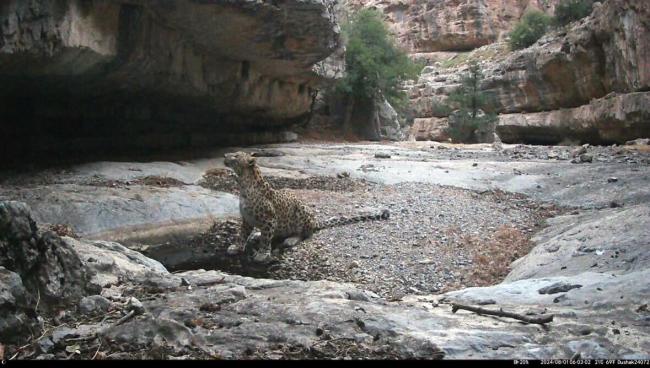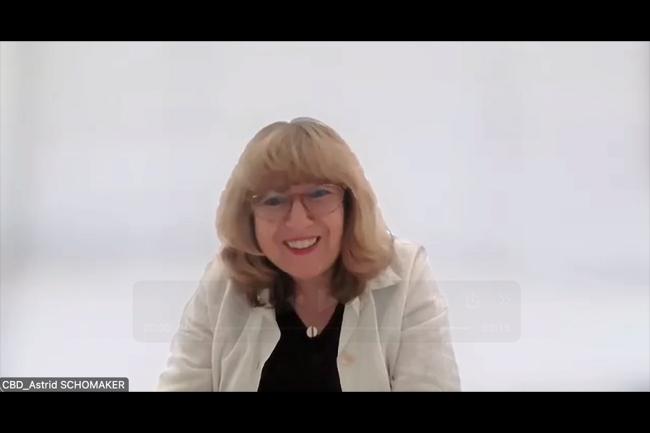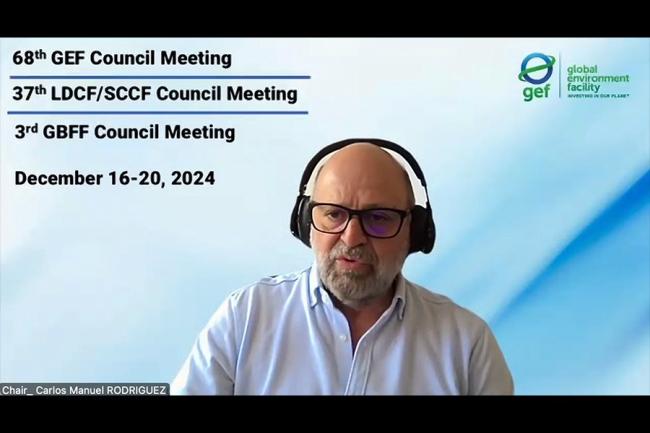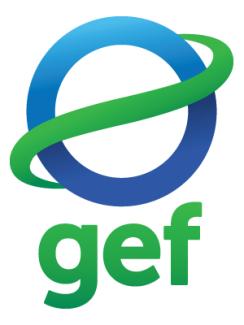The future role of the Global Environment Facility (GEF) in addressing the triple planetary crisis of climate change, biodiversity loss, and pollution was clearly front of mind among GEF Council Members on Wednesday. Council interaction with high officials from the secretariats of multilateral environment agreements (MEAs) that the GEF serves sparked discussion about the role the GEF must play as their financial mechanism. It also promoted cautionary warnings regarding the dangers of the increasing fragmentation of the financial architecture serving MEAs.
Several MEA heads outlined what they will need from the next GEF Trust Fund replenishment (GEF-9) covering 2026-2030. GEF Scientific and Technical Advisory Panel (STAP) Chair Rosina Bierbaum also outlined the STAP’s initial thoughts about GEF-9.
Convention on Biological Diversity (CBD) Executive Secretary Astrid Schomaker noted that the 16th meeting of the Conference of the Parties to the CBD (COP16) debated creating a new dedicated fund or having the GEF continue in its current role, and requested more GEF support for biosafety. She also reported that the February 2025 resumed COP will focus on resource mobilization and the Convention’s financial mechanism.
UN Framework Convention on Climate Change (UNFCCC) Deputy Executive Secretary Noura Hamladji called for GEF-9 talks to bear in mind the need for:
- simplifying fund access;
- unlocking more private sector investment;
- offering more adaptation funding; and
- promoting more coherence and complementarity among climate funds.
Stephen Mathias, UN Office of Legal Affairs as temporary secretariat of the BBNJ Agreement, stressed the importance of GEF support for BBNJ Agreement-enabling activities and swift ratifications, noting that arrangements for a GEF role in the Agreement will be addressed at the April 2025 Preparatory Commission meeting.
Basel, Rotterdam, and Stockholm (BRS) Conventions Executive Secretary Rolph Payet welcomed Council approval of the PCBs Elimination Program, which he said will be crucial to meeting the Stockholm Convention’s PCBs deadlines. He highlighted a needs assessment and review of the Convention’s financial mechanism that should inform GEF-9.
Minamata Convention Executive Secretary Monika Stankiewicz expressed concern that use of her convention's share of GEF-8 funds is still under 25% and that mercury projects are not going forward quickly enough for GEF Council or CEO approval.
Houtan Bassiri, UN Convention to Combat Desertification (UNCCD), shared a recent study finding that USD 355 billion in annual investments will be needed in the 2025-2030 period in order to achieve UNCCD targets and projections, showing a likely funding mobilization gap of about USD 278 billion.
Reacting to proposals for a new standalone fund for biodiversity, beyond the Global Biodiversity Framework Fund managed by the GEF, several Council Members cautioned against fragmentation of the financial architecture, preferring to focus on addressing the shortcomings of existing funds with great internal capacity and experience, such as the GEF. Some recipient countries countered by saying that the GEF needs to strike a better balance between its promotion of integrated approaches and serving basic MEA implementation needs for developing countries. Other Members suggested that the GEF redouble its efforts to communicate to negotiators its capacities and achievements and the catalytic role it plays in attracting co-financing.
In her report, STAP Chair Bierbaum offered seven recommendations regarding GEF-9, including:
- building on the GEF theory of change to drive portfolio-wide investment;
- investing in innovation and managing risk;
- supporting policy coherence; and
- enabling civil society to get more involved.
At the end of the day’s session, the Council decided to request the GEF Trustee to launch GEF-9 negotiations in January 2025, with a view to concluding them by April 2026 so that GEF operations can continue smoothly when GEF-8 expires on 30 June 2026. The GEF CSO Network and several Council Members urged that GEF-9 talks be inclusive of civil society, listen to recipient country voices, and match needs with ambition.
To receive free coverage of global environmental events delivered to your inbox, subscribe to the ENB Update newsletter.





























